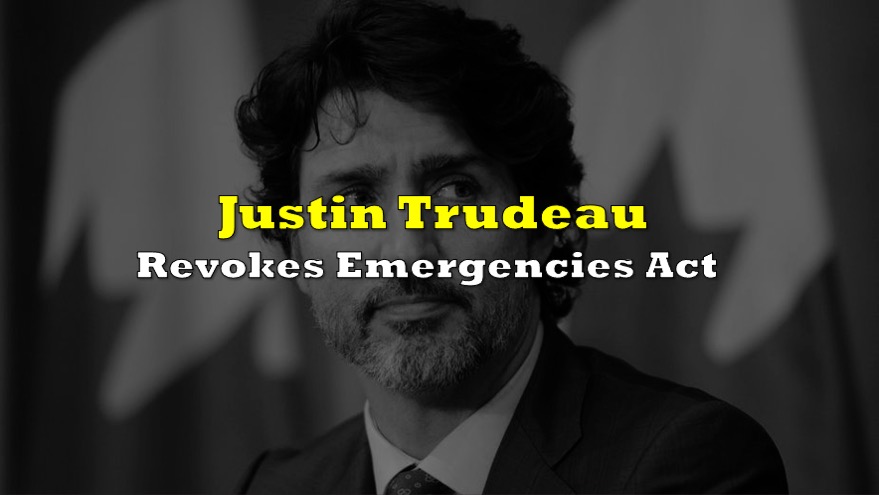Prime Minister Justin Trudeau has expressed concerns about Alberta Premier Danielle Smith’s push to withdraw the province from the Canada Pension Plan (CPP), emphasizing the potential risks to “certainty and stability” in an open letter.
Trudeau’s letter conveys his unease, stating, “With all the uncertainty they face, Canadians should not have to worry whether or not the Canada Pension Plan will continue to be there for them in their retirement.”
NEW: PMO releases open letter from the PM to Alberta premier Danielle Smith, expressing "deep concern" over the province's intentions to pull out of the Canada Pension Plan. pic.twitter.com/zxNkIkKOOU
— 𝘽𝙧𝙮𝙖𝙣 𝙋𝙖𝙨𝙨𝙞𝙛𝙞𝙪𝙢𝙚 (@BryanPassifiume) October 18, 2023
He goes on to underscore the wide-ranging repercussions of Alberta’s exit from the CPP, asserting that it would undermine the retirement security of countless seniors and hardworking individuals in Alberta and across the entire nation, asserting that such harm would be undeniable.
Danielle Smith recently released a highly anticipated report, prepared by the consulting firm LifeWorks, which claimed that if Alberta were to leave the CPP, it could claim a substantial portion of the CPP’s assets, estimated at $334 billion, representing more than half of the fund’s holdings.
Smith has been a vocal proponent of Alberta’s withdrawal from the CPP, asserting that the creation of an Alberta pension plan could result in a fairer and more cost-effective system for all residents of the province.
In his open letter, Trudeau countered this perspective, emphasizing that departing from the CPP would, in fact, introduce more uncertainty and instability into the lives of Canadians.
“Withdrawing Albertans from the Canada Pension Plan would expose millions of Canadians to greater volatility and would deny them the certainty and stability that has benefited generations,” he wrote.
The Prime Minister, acknowledging the current challenges of high inflation, climate change, and conflicts, argued that political leaders should prioritize stability over instability.
“I have instructed my Cabinet and officials to take all necessary steps to ensure Albertans — and Canadians — are fully aware of the risks of your plan, and to do everything possible to ensure CPP remains intact,” he noted. “We will not stand by as anyone seeks to weaken pensions and reduce the retirement income of Canadians.”
In response to Trudeau’s letter, Premier Smith issued her own open letter, criticizing his characterization of the impact of Alberta’s withdrawal on the CPP.
“It is disingenuous and inappropriate for you to stoke fear in the hearts and minds of Canadian retirees on this issue,” Smith wrote.
Prime Minister @JustinTrudeau is clearly against Albertans having a referendum to decide their future.
— Danielle Smith (@ABDanielleSmith) October 18, 2023
Thankfully, this decision is not his to make.
These pensions belong to Albertans. They will decide. pic.twitter.com/p1dJD1GPNI
She accused Trudeau of imposing additional costs on Albertans through the federal carbon tax and warned against any attempts to obstruct the province’s exit from the CPP. Smith threatened that such actions would be seen as a violation of Alberta’s constitutional and legal rights, with serious legal and political consequences.
During a subsequent press conference, Smith described Trudeau’s response as “overwrought” and argued that the impact of Alberta’s withdrawal on the rest of Canada would be minimal. She urged for a fair and orderly process to unfold and for Albertans to have the opportunity to decide their future.
Minister of Employment, Workforce Development, and Official Languages Randy Boissonnault, the sole Liberal minister from Alberta, expressed concerns over the diversion of attention towards the CPP plan, emphasizing that politics should not interfere with pension matters. He pointed out that the majority of feedback he has received indicates that Albertans prefer to remain in the CPP.
NDP MP Heather McPherson welcomed Trudeau’s intervention but suggested that sending a letter alone might not suffice. She stressed that withdrawing from the CPP would be detrimental to all working Albertans and seniors nationwide, likening it to a gamble with the retirement funds of Albertans.
Critics have cast doubts on the calculations in the LifeWorks report. Michel Leduc, senior managing director of the Canada Pension Plan Investment Board, dismissed the $334 billion claim as an “impossible figure.” University of Calgary economist Trevor Tombe estimated that Alberta’s entitlement was closer to 20 to 25 percent of the fund, while a 2019 briefing note from Alberta’s Finance Department put the figure at less than 12 percent.
Alberta is considering the possibility of a referendum on exiting the CPP as early as 2025. However, the first major poll conducted since Smith’s campaign began shows that the proposal is met with widespread opposition in Alberta, with 52 percent of respondents viewing it negatively, 19 percent positively, and 15 percent undecided. Those who support the idea tend to be younger Albertans, who are less immediately affected by changes to the retirement fund.


Information for this story was found via CBC and the sources mentioned. The author has no securities or affiliations related to the organizations discussed. Not a recommendation to buy or sell. Always do additional research and consult a professional before purchasing a security. The author holds no licenses.









